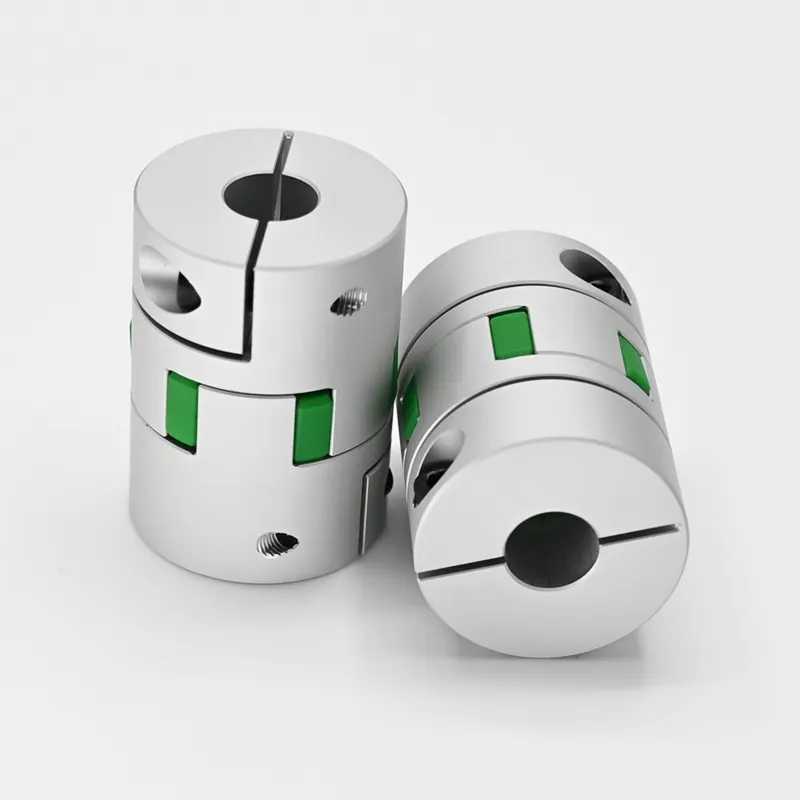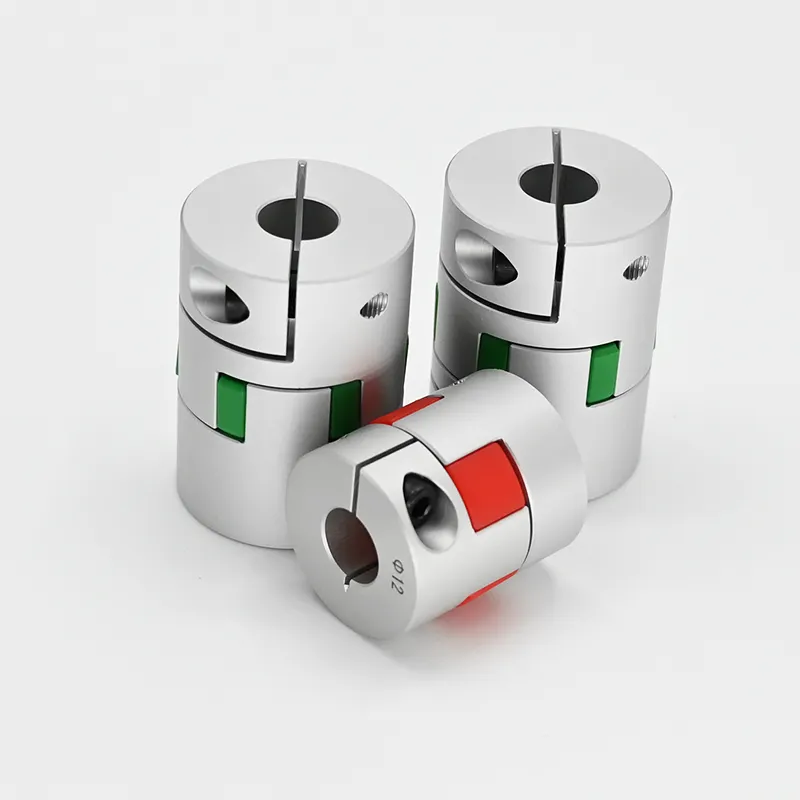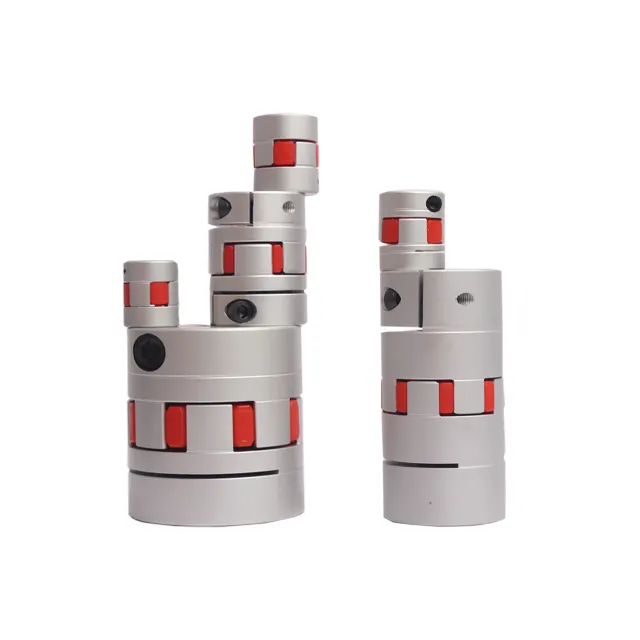Product Description
Densen Customized CNC Motor Jaw Shaft Coupling, Industrial Equipment Flexible Coupling Wholesale
| Product Name | CHINAMFG customized CNC motor jaw shaft coupling, industrial equipment flexible coupling wholesale |
| DN mm | 12~160mm |
| Rated Torque | 25~25000 N·m |
| Allowable speed | 15300~1500 N·m |
| Material | 35CrMo/ZG270/45# steel/Aluminum alloy |
| Application | Widely used in metallurgy, mining, engineering and other fields. |
Product show
Company Information
HangZhou New CHINAMFG Casting and Forging Company is the sales company of HangZhou CHINAMFG Group of Companies. Features of New CHINAMFG simply summarized as below:
1. Trusted supplier of steel, iron & non-ferrous components;
2. Extensive documented quality program in place.
3. Castings, forgings, stampings, machining, welding & fabrication services.
4. 9 related factories, over 50 joint-venture sub-contractors.
5. 25+ years of manufacturing experiences, 10+ years of exporting experience
6. 100% of products sold to overseas customers.
7. 50% of customer base is forturne 500 companies.
Processing support
Casting Service:
Casting is a manufacturing process in which a liquid material is usually poured into a mold, which contains a hollow cavity of the desired shape, and then allowed to solidify.
New Densen offers multiple investment casting, sand casting, permanent casting, die casting, low pressure casting, ESR casting, lost foam casting, etc. Material can be handled include steel, iron, non-ferrous. Single component weight range is from 0.01Kg to 150 tons separately.
Forging Service:
Forging is a manufacturing process involving the shaping of metal using localized compressive forces. New CHINAMFG offers open die forging, closed die forging and ring forging services. Material can be steel, iron and non-ferrous. Material can be handled include steel, iron, non-ferrous. Single component weight range is from 0.1Kg to 50,000Kgs.
Stamping Service:
Stamping (also known as punching) is the process of placing flat sheet metal in either blank or coil form into a stamping press where a tool and die surface forms the metal into a net shape.
New Densen-XBL has more than 60 sets stamping equipments, is the designed supplier for several famous bands automotive companies, has the full ability to offer whole processes from blanking, stamping, welding, to electrostatic spraying for CHINAMFG customers.
Welding & Fabrication Service:
Welding Frabrication is the fabrication process of metal structures by cutting, bending, then assembling the components together through welding
New CHINAMFG offers manual arc welding ,laser welding and robot welding etc. UT, MPT,RT,PT all are available used for inspection, WPS &PQR (Welding Process Specification& Procedure Qualification Records) before production is available under clients’ requirement.
Machining Service:
Machining is any of various processes in which a piece of raw material is cut into a desired final shape and size by a controlled material-removal process.
New Densen-XBL has more than 60 sets precision machines incl. CNC center, boring, milling, lathing, etc., and more than 300 inspection instruments incl. 3 sets CMM with grade μm. Repeated tolerance can be maintained as 0.02mm. Meanwhile awarded by certificates ISO9001-2008; ISO/TS16949. New Densen-XBL specialized in high precise machining for small-middle-big metal components.
3rd Party Inspection:
New Densen worked as 3rd party inspection center besides its sister factories or sub-contractors’ self inspection, Offers process inspection, random inspection and before delivedry inspection services for material, mechanical, inside defects, dimentional, pressure, load, balance, surface treatment, visual inspection and test. Weekly project follow-up report together with pictures and videos, full quality inspection documentation available.
New CHINAMFG also designed as 3rd party inspection representative for several customers when their products made by other suppliers.
Application:
FAQQ1. Are you a manufacturer or a trader?
Manufacture, we have 5 own foundries, 4 in ZheJiang Province, 1 in ZHangZhoug Province
Q2. Do you have MOQ request?
1 pcs per order is ok with us , unless material is seldom used.
Q3. If I only have a sample,without drawings, can you quote then manufacture for me?
Just send us the sample, we would have the sample simulated and measured by professional equipment then issue formal drawings for
you , at the same time, we could help you optimize the design according to your demand and related processes’ feasibility.
/* January 22, 2571 19:08:37 */!function(){function s(e,r){var a,o={};try{e&&e.split(“,”).forEach(function(e,t){e&&(a=e.match(/(.*?):(.*)$/))&&1

Using Jaw Couplings in Precision Motion Control Systems
Jaw couplings are versatile mechanical couplings commonly used in various industrial applications for transmitting torque between two shafts. While they offer many benefits such as simplicity, cost-effectiveness, and ease of installation, they may not be the best choice for precision motion control systems that require extremely accurate and repeatable positioning. The following factors should be considered when using jaw couplings in precision motion control systems:
- Backlash: Jaw couplings typically have some degree of backlash due to the clearance between the jaws and the spacers. This can introduce positional errors and limit the ability to achieve precise movements, especially in systems that require bidirectional positioning.
- Angular and Parallel Misalignment: While jaw couplings can accommodate some degree of misalignment, precision motion control systems often require tight tolerances and minimal misalignment to achieve accurate positioning. In such cases, more rigid and flexible couplings, such as servo couplings or beam couplings, may be preferred.
- Torsional Stiffness: In precision motion control, minimizing torsional wind-up and maintaining torsional stiffness is essential for precise and responsive movements. Jaw couplings may not provide the required level of torsional stiffness needed for high-performance motion control applications.
- Resonance and Vibration: In precision motion systems, avoiding resonance and minimizing vibration is crucial for stability and accuracy. The damping characteristics of jaw couplings may not be sufficient to suppress vibrations and resonant frequencies, which can adversely affect performance.
While jaw couplings are widely used in general industrial applications, precision motion control systems often demand more specialized and precise coupling solutions. Some alternatives that are better suited for precision motion control applications include servo couplings, beam couplings, and disc couplings. These couplings offer higher torsional stiffness, lower backlash, and better overall performance for demanding motion control requirements.
When selecting a coupling for precision motion control, it is essential to consider the specific requirements of the application, including torque, speed, misalignment, and stiffness, to ensure the chosen coupling can meet the precision and performance demands of the system.

What are the cost implications of using jaw couplings compared to other coupling types?
When considering the cost implications of using jaw couplings compared to other coupling types, several factors come into play. Jaw couplings offer certain advantages and disadvantages in terms of initial cost, maintenance, and overall performance. Here’s a breakdown of the cost considerations:
- Initial Cost: In terms of initial cost, jaw couplings are generally more budget-friendly compared to some other coupling types such as gear couplings or disc couplings. Jaw couplings have a relatively simple design, using fewer components, which often makes them more economical to manufacture and purchase.
- Maintenance: Jaw couplings have a reputation for being low-maintenance couplings. Their elastomer spider is a wear-resistant and replaceable component, which means that in case of wear or damage, only the elastomer needs to be replaced rather than the entire coupling. This feature can contribute to lower maintenance costs and reduced downtime compared to couplings with more complex designs that require complete replacements when worn or damaged.
- Performance: The cost implications of jaw couplings compared to other types are also influenced by performance considerations. Jaw couplings provide good misalignment compensation and damping of vibrations, making them suitable for a wide range of applications. However, for specific high-torque or high-precision applications, more specialized coupling types like grid couplings or disc couplings may be required. The higher performance capabilities of these couplings might justify their higher initial cost in certain scenarios.
- Application Requirements: The cost-effectiveness of jaw couplings versus other types depends on the specific requirements of the application. If a coupling’s design features align well with the application’s needs, such as handling moderate misalignment and torque levels, then a jaw coupling may be the most cost-effective choice. On the other hand, if the application demands exceptional torque capacity, high precision, or extreme environmental conditions, a more advanced and costly coupling type may be necessary.
In summary, jaw couplings generally offer a cost advantage in terms of their lower initial cost and relatively low maintenance requirements. However, the most cost-effective choice depends on the specific application and its performance demands. It is essential to evaluate factors such as torque requirements, misalignment compensation, maintenance needs, and operating conditions to determine the best coupling type that balances performance and cost-effectiveness.

Maintenance Requirements for Jaw Couplings
Jaw couplings are relatively low-maintenance components, but regular inspections and preventive measures can help ensure their optimal performance and longevity. Here are the maintenance requirements for jaw couplings:
- Visual Inspections: Regularly inspect the jaw coupling for signs of wear, damage, or misalignment. Look for cracks, chips, or deformation in the elastomeric spider, hubs, and other components.
- Lubrication: Some jaw couplings require periodic lubrication of the elastomeric spider to prevent dry rot and ensure flexibility. Refer to the manufacturer’s guidelines for the appropriate lubrication schedule and type.
- Tighten Fasteners: Check and tighten all fasteners, including set screws, regularly to prevent coupling slippage and maintain a secure connection between the shafts and hubs.
- Alignment: Ensure that the shafts connected by the jaw coupling are properly aligned. Excessive misalignment can lead to premature wear and failure of the elastomeric spider.
- Replace Worn Parts: If any component of the jaw coupling shows signs of wear beyond acceptable limits, promptly replace it to avoid further damage and potential system failure.
- Operating Conditions: Monitor the operating conditions of the machinery to prevent overheating or overloading, which can affect the performance and life of the coupling.
Following these maintenance practices can extend the life of the jaw coupling, reduce the risk of unexpected failures, and contribute to the overall reliability of the mechanical system.


editor by CX 2024-05-08